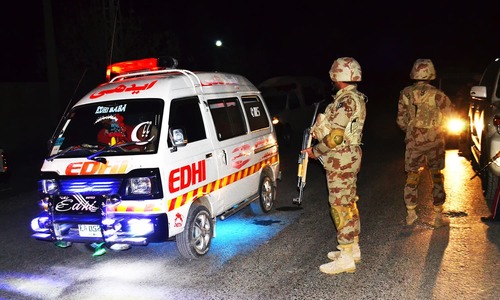PM, army chief attend high-level security meeting in Quetta after police college carnage
Prime Minister Nawaz Sharif and Chief of Army Staff (COAS) Gen Raheel Sharif on Tuesday reached Quetta, a day after terrorists stormed a police training college in the provincial capital in one of the deadliest militants attacks this year.
Three heavily-armed militants wearing suicide vests stormed a police academy in Quetta, killing at least 60 people and wounding dozens more.
During a high-level security meeting in Quetta, the prime minister directed all law enforcement agencies in the province to take strict action against banned outfits, sources privy to the meeting told DawnNews.
The premier called for better inter-agency coordination between police, Frontier Corps and intelligence agencies, they said.
The matter of suspected Afghan and Indian intervention in Balochistan may also be taken up at a diplomatic level in the Foreign Office, the sources added.
Various aspects of the deadly attack, and the prevailing law and order situation in Quetta were also discussed during the meeting, Radio Pakistan reported.
Among the meeting's attendees were Gen Raheel, Balochistan Governor Muhammad Khan Achakzai, Balochistan Chief Minister Sanaullah Zehri and Interior Minister Chaudhry Nisar.
Zehri announced a three-day mourning period in the province to mourn those who lost their lives in the attack.
Earlier, the prime minister and army chief, accompanied by Commander Southern Command Lt General Aamir Riaz, National Security Adviser Lt Gen (retd) Nasser Janjua and the interior minister, visited Civil Hospital to meet those injured in the attack, Radio Pakistan reported.
The army chief also visited the police training academy where he reviewed the security situation and was briefed on the attack by officials. Gen Raheel met police officials, and army and Frontier Corps troops who carried out the operation last night to clear the area and eliminate the attackers.
The army chief appreciated the morale, courage and determination of security forces personnel.
Imran questions lack of proper implementation of NAP
PTI chief Imran Khan, on his arrival in Quetta, questioned the lack of proper implementation of the National Action Plan (NAP) and said there is no reason to delay the same.
“All political parties had agreed upon and signed National Action Plan, so why it so that it has still not been properly acted upon?”
One of the salient features of NAP was to break the nexus between corruption and terrorism, even the army chief has repeatedly said that the nexus needs to be broken, added Imran.
Imran on the occasion also asked why Pakistan has been fighting “someone else’s war”.
The PTI chief also paid tribute to those who were killed and injured in the attack.
'Poor security arrangements'
Senior police officials claimed there were poor security arrangements at the academy.
Despite security threats and being located in one of Quetta's sensitive areas, the boundary wall of the police training centre was a mud wall five feet high, the officials said.
On Sept 6, Inspector General Police Balochistan, Ahsan Mehboob had requested the CM for construction of a boundary wall for the academy. The CM had promised the construction of a wall.
The attack, however, took place before the wall could be constructed.
'Enemy weakened, not finished'
Interior Minister Chaudhry Nisar addressing a passing out parade said, "The enemy has been weakened but is not finished."
He said terrorists are operating from across the border, adding that the remaining elements will be defeated at all costs, Radio Pakistan reported.
Nisar emphasised a need for greater coordination amongst law enforcement agencies to foil the designs of enemies.
Inspector General Police Sindh Ghulam Hyder Jamali ordered an increase in secuirty duties across Karachi after the attack in Quetta.
Condemnations pour in
Information Minister Pervaiz Rashid strongly condemned the terrorist attack at the police academy.
“Perpetrators of this act are enemies of peace, development and progress,” he said.
He added that the government would not rest until the elimination of the last terrorist from Pakistani soil.
He expressed his sympathies for the families of those killed and prayed for the early recovery of the injured.
Afghan President Ashraf Ghani and CEO Abdullah Abdullah condemned the attack in Quetta, saying "terrorism is a common threat for the stability of the region and world," Tolonews reported
The United States also condemned the terror attack. State Department Spokesman John Kirby said that the US would continue to work with "our partners in Pakistan and across the region" to combat the threat of terrorism.
Additional reporting by Imtiaz Ali in Karachi and Syed Sammar Abbas in Islamabad.












































